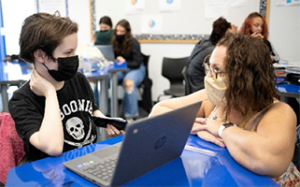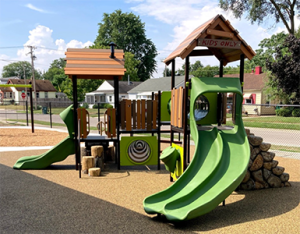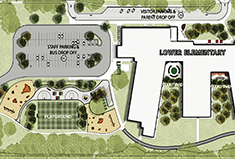The Ferndale School District: Fostering a Culture of Support
By William Good
THE PANDEMIC HAS BEEN CHALLENGING FOR OUR COMMUNITIES, and Ferndale Schools are no exception. High-quality instruction continues safely in our schools, and we are progressing swiftly to heal all of the difficulties of the recent cultural challenges while continuing our commitment to positive improvements.
SUPPORTING STUDENT NEEDS
 FERNDALE TEACHERS HAVE LONG UNDERSTOOD THAT NOT EVERY STUDENT enters the classroom the same. Some start with the skills and knowledge to exceed expectations, and some have to be taught these prerequisite skills first. These challenges can be academic or behavioral. Still other students are eager to accelerate their learning journey.
FERNDALE TEACHERS HAVE LONG UNDERSTOOD THAT NOT EVERY STUDENT enters the classroom the same. Some start with the skills and knowledge to exceed expectations, and some have to be taught these prerequisite skills first. These challenges can be academic or behavioral. Still other students are eager to accelerate their learning journey.
And this level of preparedness may vary for an individual student every year, or every day. In many ways, addressing the needs of students returning from Distance Learning is familiar territory. However, social changes and a pandemic are showing their impact.
Fortunately for our students, Ferndale Schools are prepared with a robust system of supports that adapts to each child. Achieving this includes:
• Fostering a Culture of Support.
• Identifying Needs.
• Deploying and Adapting Support as Needed.
Learn more about the process and see support examples at www.FerndaleSchools.org/MTSS.
RESTORATIVE SCHOOL CULTURE
STUDENTS SPEND A LOT OF TIME IN SCHOOL. In classes, clubs, cafeterias and common spaces, students develop complex relationships with classmates as well as adults and other peers at different stages of development than their own. All of these interactions amount to a very dynamic set of variables influencing each child while at school.
Guiding these relationships in a positive direction requires a school culture with well defined principles and clearly communicated expectations of behavior, attitudes, and procedures for seeking support. At Ferndale Schools, we guide our culture with empathy by putting Restorative Practices at the forefront of everything we do.
WHAT ARE RESTORATIVE PRACTICES?
RESTORATIVE PRACTICES include appealing to relationships and proactively encouraging empathy for others. By emphasizing pro-active culture building, we reduce the need for responsive behaviors such as punishment that may instill shame in students and isolate them from classmates and support networks. Making poor decisions is most often the result of situational effect or mood. By encouraging peer to peer interactions in the classroom, we strengthen those connections that provide a vital support network for our students.
Cultivating our school culture improves our schools by:
• Increasing sense of community and belonging.
• Reducing instances of interpersonal conflict.
• Reducing the need for punitive discipline.
CULTURALLY CONNECTED
 SHOWING EMPATHY TO OTHERS REQUIRES SOME UNDERSTANDING of their experiences, and connecting ourselves to those experiences. Our school culture is not simply a reflection of or a response to the world we live in, it is a connection with it. Connection is forged by developing an understanding in our students, staff, and community that includes all aspects of cultural strengths and cultural inequities. With understanding comes the opportunity to include the methods communities have developed to reduce stress and build resilience which fit their unique culture.
SHOWING EMPATHY TO OTHERS REQUIRES SOME UNDERSTANDING of their experiences, and connecting ourselves to those experiences. Our school culture is not simply a reflection of or a response to the world we live in, it is a connection with it. Connection is forged by developing an understanding in our students, staff, and community that includes all aspects of cultural strengths and cultural inequities. With understanding comes the opportunity to include the methods communities have developed to reduce stress and build resilience which fit their unique culture.
Learn more about our Restorative Practice strategies in Ferndale Schools and the core principles that you can practice at home at www.FerndaleSchools.org/Restore.
FACILITY IMPROVEMENTS
We have been making major improvements to our facilities, paving the way for 21st century learning and play. You can view more photos and details at FerndaleSchools.org/New



